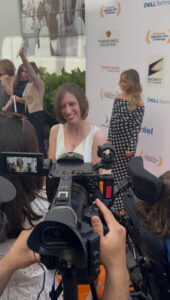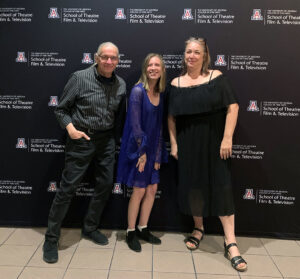 Hope Baker (BA ’22, Communications with a Theatre minor) is an actor, writer, and advocate whose creative journey took root at the University of Arizona School of Theatre, Film & Television (TFTV). Baker found her voice through TFTV’s improv and writing courses, guided and inspired by Theatre faculty members Roweena Mackay and Rick Wamer. A pivotal moment came when a script she submitted just for fun was selected for the inaugural New Directions Festival, revealing a new path forward as a storyteller. This year, Baker, who lives with cerebral palsy, became an award-nominated filmmaker in the Easterseals Disability Film Challenge, launched her own production company, and signed for representation across the board with LA-based Zuri Agency.
Hope Baker (BA ’22, Communications with a Theatre minor) is an actor, writer, and advocate whose creative journey took root at the University of Arizona School of Theatre, Film & Television (TFTV). Baker found her voice through TFTV’s improv and writing courses, guided and inspired by Theatre faculty members Roweena Mackay and Rick Wamer. A pivotal moment came when a script she submitted just for fun was selected for the inaugural New Directions Festival, revealing a new path forward as a storyteller. This year, Baker, who lives with cerebral palsy, became an award-nominated filmmaker in the Easterseals Disability Film Challenge, launched her own production company, and signed for representation across the board with LA-based Zuri Agency.
We caught up with Baker to reflect on her journey, her mentors, and her mission to champion authentic disability representation on screen and on stage.
Among your multiple achievements in 2025 is Silent Control, the short film you produced and starred in for the Easterseals Disability Film Challenge, the annual filmmaking contest championing new voices in the entertainment industry. Tell us about your film and the creative journey behind it.
This year marked my third year participating in the Easterseals Disability Film Challenge, and I was eager to dive in again. I began connecting with fellow filmmakers around Phoenix who I thought might be excited to collaborate. A small but passionate team came together, and we started brainstorming concepts within this year’s assigned genre: thriller and suspense. That’s how Silent Control was born—a chilling story about a woman who turns to ASMR to manage her anxiety, only to find herself caught in a web of deadly consequences.
With just one week to film, edit, and submit, we pushed ourselves to the limit. We shot everything in a single day, which was both exhilarating and nerve-wracking. The energy on set was electric—everyone was deeply committed to bringing this vision to life. As part of the Awareness Campaign, we launched an Instagram page to promote the film, and I was blown away by the incredible response Silent Control received.
 Silent Control was nominated in the Best Awareness category presented by Amazon MGM Studios, a category recognizing outstanding films that best raise awareness about disability issues. You attended the awards ceremony at Sony Pictures Studios – what was that day like, and what opportunities arose from the experience for you and for the film?
Silent Control was nominated in the Best Awareness category presented by Amazon MGM Studios, a category recognizing outstanding films that best raise awareness about disability issues. You attended the awards ceremony at Sony Pictures Studios – what was that day like, and what opportunities arose from the experience for you and for the film?
It truly felt like a dream realized. The entire day was magical—being surrounded by filmmakers who are leading the charge for disability inclusion in the industry was deeply inspiring. Acting has been my passion since childhood, so stepping into that space felt surreal. It was exciting networking and hearing other filmmaker’s perspectives on why inclusive storytelling is important to them.
Through a connection I made at the EDFC Awards, I was signed by Zuri Agency under their Adaptive and Inclusive Division. It was everything I’ve been working toward.
We were excited to learn that Silent Control will screen at the Heartland Film Festival this October in Indianapolis. I’m beyond thrilled to see our work continue to reach new audiences.
Congratulations on signing with Zuri Agency in their full-service Adaptive and Inclusive division! The division represents differently abled talent across the board in the U.S. What changes do you hope to see in the film and television industry when it comes to disability representation?
Thank you so much! I’m incredibly excited about this next chapter in my career. My deepest hope is that we continue to see stories that reflect authentic representation across all communities. As someone living with Cerebral Palsy, I’m passionate about creating space for disabled voices to be heard and celebrated.
Growing up, I rarely saw characters who had Cerebral Palsy and could walk—something that reflects my own experience. It’s vital that we showcase the full spectrum of disabilities, because everyone’s path is different. That applies not just to CP, but to all forms of disability. We’ve made tremendous progress toward inclusion, but there’s still more work to be done.
Let’s go back to your time at TFTV and your writing debut at the New Directions Festival. How did it feel to see your writing recognized for the first time? Did it change how you see yourself as a creator?
Wow, that experience will always hold a special place in my heart! The play I had written, Cruel Summer, was based on a true story that dealt with hard topics and family dynamics. That story follows a girl who returns to her home town for a family funeral while facing childhood trauma. At its core, it’s a journey of self-discovery and the empowering choice to put yourself first.
It’s funny, I never saw myself as a writer, but this play changed everything. It opened new possibilities for me to start telling my own stories. Roweena Mackay and Rick Wamer were the greatest sources of support during the New Directions Festival.

How did TFTV faculty Roweena Mackay and Rick Wamer influence your journey?
I had auditioned for the BFA Acting program twice and didn’t make it. It was a heartbreaking process – in some ways it felt like a make-or-break moment. After taking some time away to reflect and figure out what my next steps would be, I declared a major in Communications with a minor in Theatre Arts.
During the fall semester of my senior year, I enrolled in a play devising course taught by Rick and Roweena and loved every minute. At the time, I wasn’t sure if pursuing a career in the industry was in the cards for me. One day, after class I spoke with them about my journey and my hopes for the future. I remember Roweena stating that the journey isn’t always how we planned but often turns out better than we expected. From there, they both took me under their wing. They believed in me more than I believed in myself and I would not be here today if it weren’t for them. Rick and Roweena opened doors for me to expand my skills as a storyteller, and for that I will forever be grateful.
You recently launched Have Hope Productions. What inspired you to start your own production company and what kinds of stories are you excited to tell?
The success of Silent Control motivated me to continue creating my own work. One of my biggest inspirations is Reese Witherspoon – I applaud her work advocating for women-centric stories via her production company, Hello Sunshine. My hope (no pun intended haha) is to showcase stories through a disability lens. We all have something that makes us unique and that is often our greatest strength. I believe in telling stories that celebrate diversity and inclusion in all aspects. My ultimate goal is to help others discover and amplify their voices, using storytelling to promote change.
Lastly, I want to thank my family for their unconditional love and support throughout my entire journey. My parents always encouraged me to chase after my dreams.
